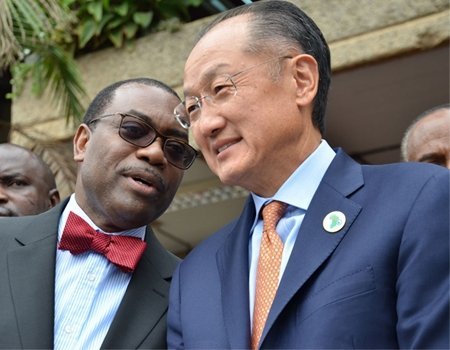By Adama Wade, Special Envoy to Busan.
If all agree on the development of Africa, some like the president of the World Bank are quite reserved on industrialization.
He uses nuance, Jim Yong Kim. But the president of the World Bank is nonetheless firm. The industrialization of Africa must be conditioned by the creation of jobs. Admirer of technological transitions, the boss of the World Bank, keystone of multilateral development institutions, is rather in favor of diversification.
Rwandan UAVs carrying blood bags and the M-Pesa system rather than heavy industry, said the South Korean in substance at the high-level panel held in Busan, South Korea, May 23, on the sidelines of AfDB General Meetings.
Contrary to this conception drawn from the post-industrial mold currently in vogue, the president of the African Bank advocates a concentration on the development of agriculture and industrialization, two processes on which he makes success depend on “Clear vision of the government”.
And Akinwumi Adesina to cite the example of Ethiopia, which has become a global subcontracting center for the textile and clothing industry thanks to a state strategy and an alliance with Chinese companies.
The African challenge remains the long-term mobilization of resources, notably sovereign funds, which sometimes deplore the AfDB president, tend to put their funds out of the continent for negative returns, causing them to change “Sovereign wealth funds for others”. Nigerian advocates a real strategy around these funds and around the question of “risk Africa” overvalued, he says, with global investors.
While he agrees with Akinwumi Adesina on the importance of training young Africans and human capital, the boss of the World Bank is skeptical about the Ethiopian model he opposes, with figures in support, the model. from Bangladesh that has managed to create up to 300,000 jobs a year over a long period in the IT process of German companies in the sector and other companies.
Clearly, integration into value chains starts with investment in education and the point of arrival is job creation. “It is important to understand the Korean model, which is based on education, the rise of chaebols and their exposure to competition and market forces,” says the World Bank boss. And Dr. Kim, admiring the Rwandan model and President Paul Kagame, whom he cites for the quality of his leadership, to shout at African leaders, those who change their prime minister all the time and therefore have no sustainable strategy.
Present at this meeting along with his Moroccan counterpart, the Rwandan Prime Minister, Édouard Ngirente, talks about the conditions of industrialization, training in technical fields. Saâdeddine El Otmani from Morocco says no less, calling for investment in the trades of tomorrow because, he notes, 60% of current trades will disappear. “Africa needs a multi-factorial transformation, to take into account the social challenges (jobs, poverty) and not to miss the fourth industrial revolution.
On arrival, it can be said, the four panellists are at least in agreement on the reduction of factor costs and the need for a clear vision incarnated at the top of the state.



